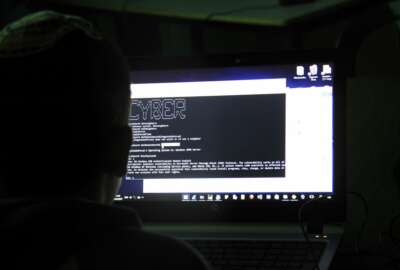GSA relinquishes control of the ‘dot-gov’ domain to CISA
In today's Federal Newscast, the General Services Administration formally gives up its management of the Internet’s “dot-gov” top-level domain today.
To listen to the Federal Newscast on your phone or mobile device, subscribe in PodcastOne or Apple Podcasts. The best listening experience on desktop can be found using Chrome, Firefox or Safari.
- The General Services Administration formally gave up its management of the Internet’s “dot-gov” top-level domain today. The Department of Homeland Security’s Cybersecurity and Infrastructure Security Agency took charge of most aspects of managing and securing the dot-gov space last March. A new rule GSA published today gets rid of the last vestiges of its regulations for dot-gov, after having handled the domain for the past 20 years.
- The Cybersecurity and Infrastructure Security Agency looks to drill down into its software ingredients initiative. CISA is creating four working groups to help drive forward its Software Bill of Materials effort. In a note to stakeholders, CISA’s Allan Friedman described next steps for the SBOM project. One working group will look at how to integrate SBOMs into cloud and online applications. Another will study tools and implementation. The third working group will examine best ways to share SBOM data, while a fourth will look at on-ramps and adoption. An SBOM is essentially a list of ingredients for software. The Biden administration is looking at how to use SBOMs to improve cybersecurity across agencies.
- The Treasury Department is giving state, local and tribal governments more flexibility in how they spend $350 billion in COVID funds. A final rule from the agency allows state and local governments to use COVID relief funds to replace up to $10 million in lost public-sector revenue during the pandemic. It also allows them to use the funds to build affordable housing, child care facilities, schools, hospitals, and other facilities tied to public health or economic recovery. The funds can also go toward premium pay for front-line workers and infrastructure costs like water, sewer and broadband upgrades. The final rule goes into effect April 1.
- Agencies are going to pay less for certain HR services in 2022. The Office of Personnel Management is cutting the amount of money it charges agencies to maintain the electronic official personnel file or eOPF. The OPM inspector general determined OPM’s HR Solutions office over charged agency customers by more than $5.4 million in 2020. OPM told the IG it would adjust future billings for the eOPF. Additionally, OPM said it’s strengthening the internal controls of the program by adding a management review step for pricing calculations and updating the Billing Standard Operating Procedure (SOP).
- The Transportation Department laid out six principles to drive innovation in all of its mission areas. DoT wants to make sure its employees have the necessary skillsets to help shape innovation. DoT said the technology must be flexible and they must learn quickly from failures. And DoT must promote collaboration across the public and private sectors. The goal of these principles is to give employees concepts to follow that should reduce deaths and serious injuries on the nation’s transportation network, while ensuring high standards of safety across technologies.
- The Postal Service’s regulator is asking what the future holds for a recent postal banking pilot. The Postal Regulatory Commission is asking USPS whether it plans to expand its postal banking pilot next fiscal year, or terminate the program. For a flat fee of $5.90 cents, customers can purchase a single-use gift card worth up to $500, using a business or payroll check as payment. USPS launched the program last September at four post office locations. The PRC asked USPS why it launched the pilot without prior review from the commission, and how USPS trained its employees to provide these financial services to its customers. The commission seeks answers no later than Jan. 14.
- The White House put forward its pick for a top FEMA job. President Joe Biden intends to nominate Alice Hill to serve as deputy administrator for resilience. If confirmed, she’ll oversee the National Flood Insurance Program, FEMA grants and national continuity programs, among other efforts. Hill previously served in the Obama administration as Senior Director for Resilience Policy on the National Security Council. She also led the development of the Department of Homeland Security’s first climate adaptation plan. Hill currently works as a senior fellow at the Council on Foreign Relations.
- The Defense Department is expanding its annual workplace and gender relations survey. The questionnaire helps the Pentagon and military services keep track of the state of sexual assault and harassment. In past years, only about half of troops were eligible to respond to the survey. DoD is now widening the group of people who can take it. All active duty or reserve troops will be able to take at the very least a shortened version of the survey.
- The Air and Space Forces are looking for better ways to meet with service members when they are feeling troubled. The Department of the Air Force is putting together a new task force to study mental health and issues of airman resilience in the service. The Fortify the Force initiative is slated to begin work in the next few weeks. The team will consist of members of the Air Force and Space Force. Those service members will help identify lines of effort so officials can better tackle mental wellness. Chief of Staff of the Air Force General C.Q. Brown said the services want to provide their leaders with better tools to engage troops about mental health. In 2019, the Air Force had a one-day stand down due to the rising number of suicides.
- The Navy is adding another two weeks to its basic training program for all new sailors. That service’s version of boot camp will now last ten weeks. Officials said the new two-week add-on is meant to reinforce what recruits have already learned during their initial training, but it’ll also focus on life skills like personal financial management, leadership, sexual harassment prevention, and preparing for high-stress scenarios. The new training program took effect at the start of the New Year. (Federal News Network)
Copyright © 2025 Federal News Network. All rights reserved. This website is not intended for users located within the European Economic Area.
Eric White
Eric White is news anchor and Federal Drive producer at Federal News Network.
Follow @FEDERALNEWSCAST
Related Stories
Related Topics
All News
Cybersecurity and Infrastructure Security Agency
Department of Homeland Security
DOTGOV Act
Federal Drive
Federal Newscast
federal websites
FEMA
General Services Administration
Management
mental health
Office of Personnel Management
Postal Regulatory Commission
Postal Service
SBOM
sexual harassment
sexual harassment complaints
Space Force
Technology
Tom Temin
Transportation Department
Treasury Department






